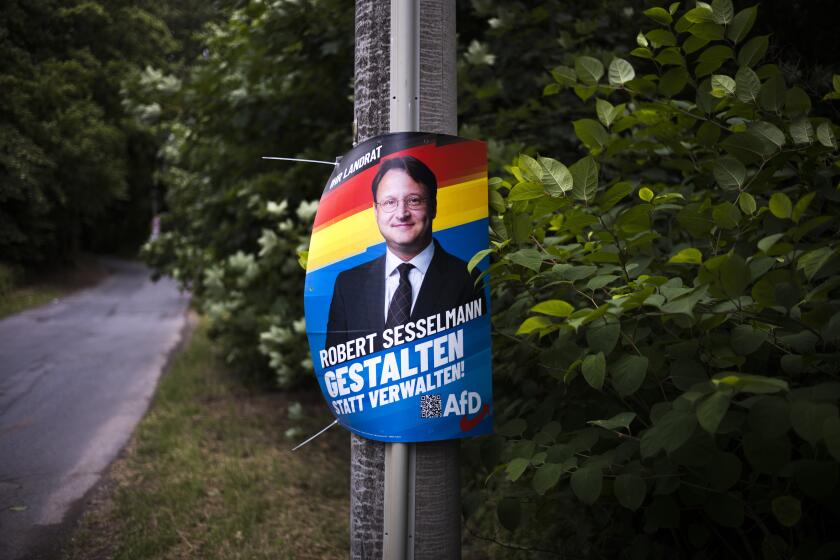A candidate for Germany’s key party was beaten up while campaigning for European elections

- Share via
BERLIN — A candidate for Chancellor Olaf Scholz’s center-left party in next month’s election for the European Parliament was beaten up and seriously injured while campaigning in an eastern city, the party said Saturday.
The incident raised political tension in Germany ahead of the polls, and came as Europe’s center left urged the center right not to cooperate with far-right parties expected to win more seats in the European Parliament.
Matthias Ecke, a candidate for the Social Democrats, was attacked while putting up posters in Dresden on Friday night. The party said he was taken to a hospital and required surgery for his injuries. Police said the 41-year-old was beaten by four men and that the same group had apparently attacked a Greens party worker minutes before in the same street.
Interior Minister Nancy Faeser, who is also a Social Democrat, said that if it’s proved that the assault on Ecke was politically motivated, it would represent “a serious attack on democracy.”
“We are experiencing a new dimension of anti-democratic violence,” Faeser said. She promised “tougher action and further protective measures for the democratic forces in our country.”
Government and opposition parties say their members and supporters have faced a wave of physical and verbal attacks in recent months, and have called on police to step up protection for politicians and election rallies.
The election of the first head of a county administration by the far-right Alternative of Germany in a region has led to concern among opponents.
Many of the incidents have taken place in the former communist east of the country, where Scholz’s government is deeply unpopular. The Interior Ministry in the state of Saxony, which includes Dresden, said it had registered 112 election-related crimes so far this year, including 30 against elected officials or representatives.
The far-right and antiestablishment Alternative for Germany party, or AfD, is expected to make big gains, especially in the east, in both the European elections and in German state elections in the fall.
The AfD belongs to the Identity and Democracy grouping, one of two far-right groups in the European Parliament alongside the European Conservatives and Reformists. European Commission President Ursula von der Leyen last week suggested she might work with the latter group to secure a second term.
Russian President Vladimir Putin’s KGB years in East Germany offer a window into his crackdown on protests, war on Ukraine and yearning for empire.
The main center-left grouping, the Party of European Socialists, which includes the German Social Democrats, on Saturday issued a declaration calling the rise of the far right “a threat to the European project” and citizens’ rights.
“We call on all democratic European parties to firmly reject any normalization, cooperation or alliance with the far right,” they said in the declaration, issued after a meeting in Berlin. “We expect them to include this formally and unequivocally in their election manifestos and party declarations.”
Mainstream parties accuse the AfD, which wants to reverse European integration, of links to violent neo-Nazi groups and of fomenting an increasingly intimidating political climate. A prominent AfD leader, Bjoern Hoecke, is currently on trial accused of using a banned Nazi slogan.
Tino Chrupalla, co-chair of the AfD, said his party “deeply condemns physical attacks against politicians of all parties.”
“Election campaigns must be tough and constructive in terms of content, but without violence,” Chrupalla said in a social media post, wishing Ecke a speedy recovery.
The AfD, whose rallies often draw counter-demonstrations, says its members also suffer attacks and harassment.
On Saturday, police said they detained a man who hit and slightly injured a state lawmaker for the AfD as he was campaigning in Norden, a town near Germany’s North Sea coast. The assailant also pelted the lawmaker with eggs.
Graham writes for the Associated Press.
More to Read
Sign up for Essential California
The most important California stories and recommendations in your inbox every morning.
You may occasionally receive promotional content from the Los Angeles Times.












